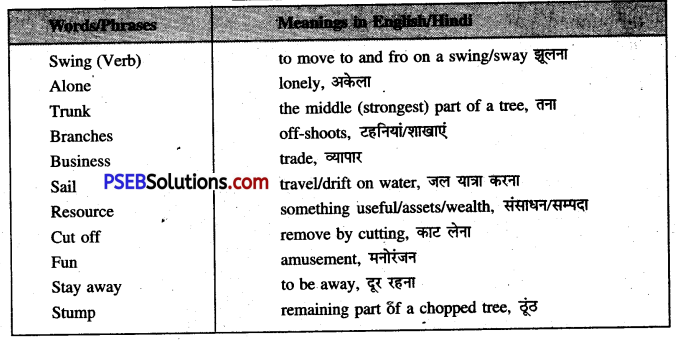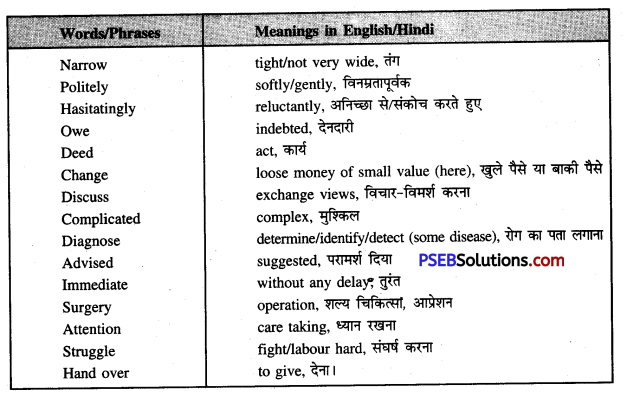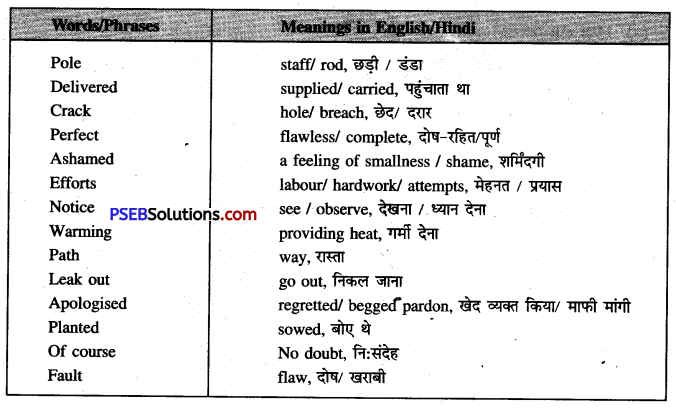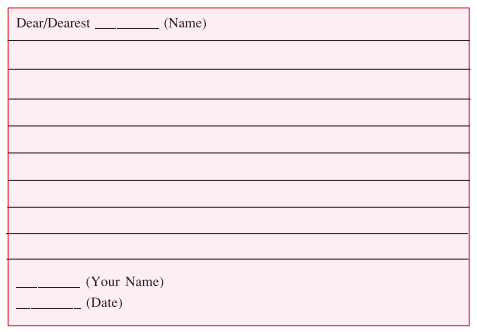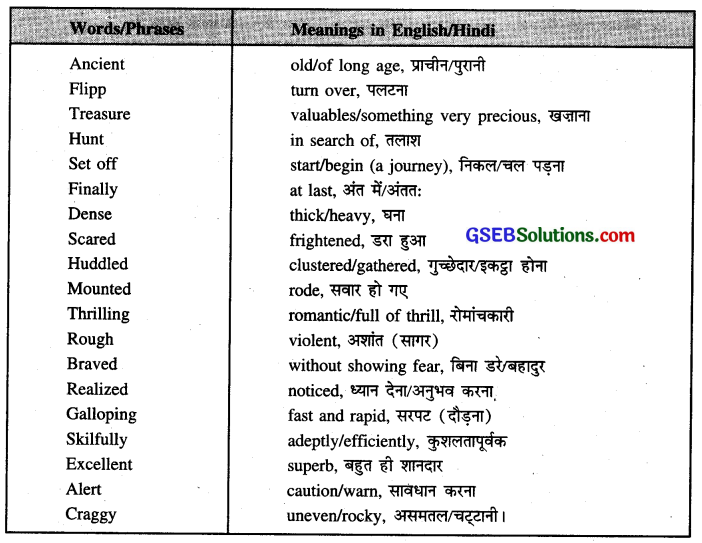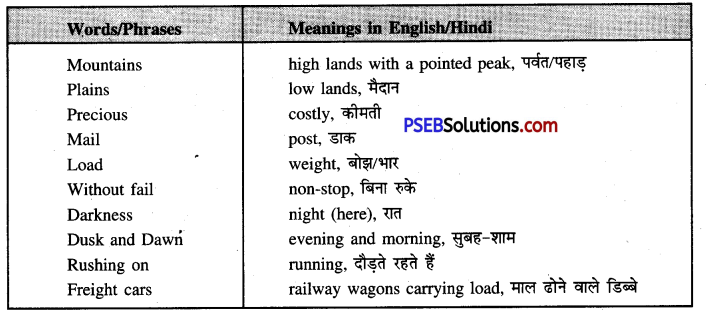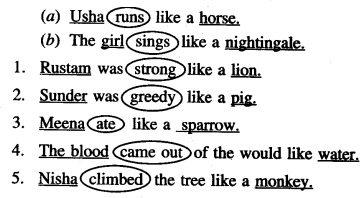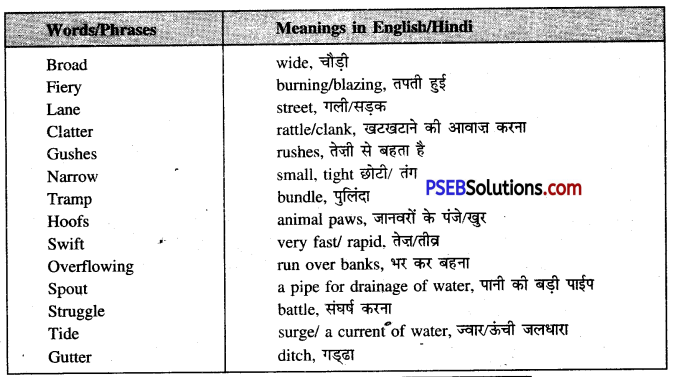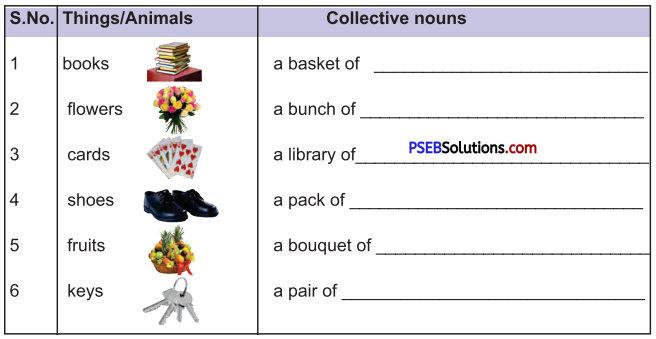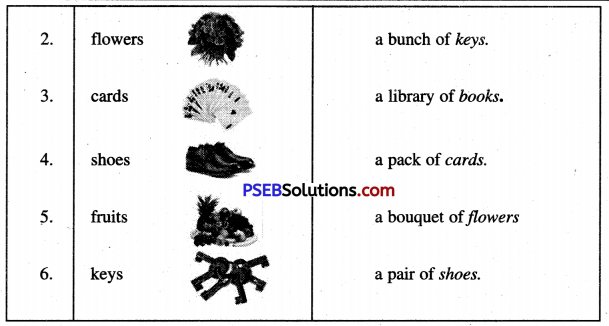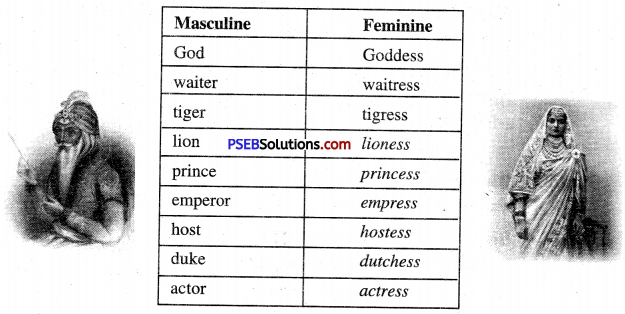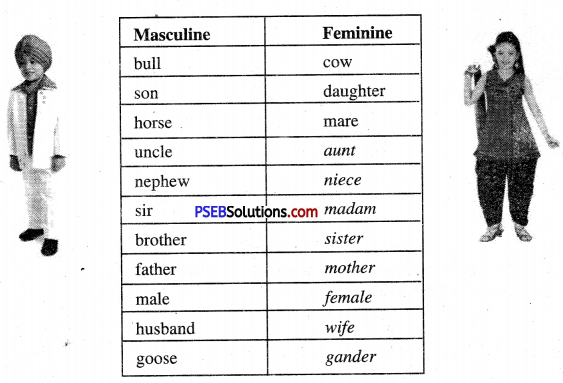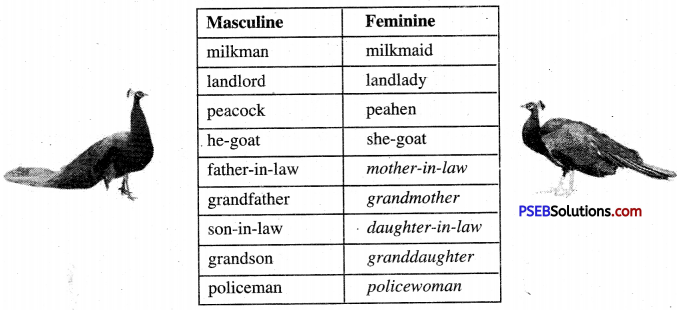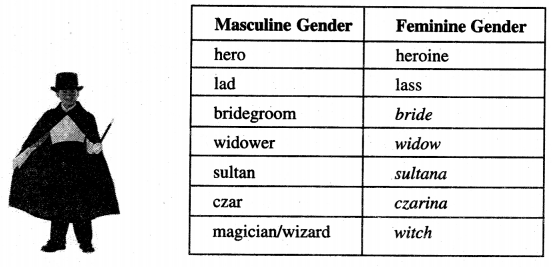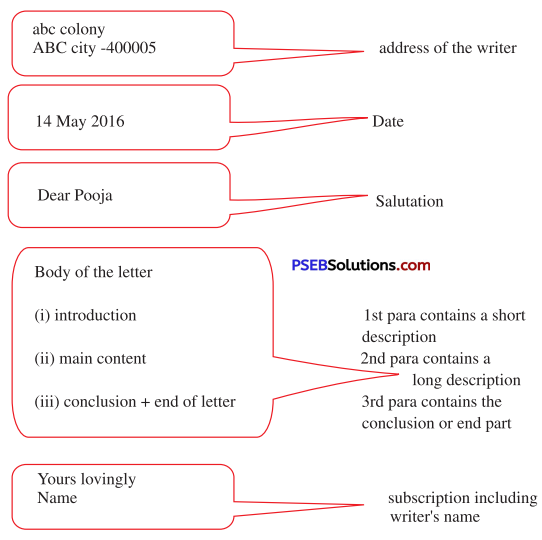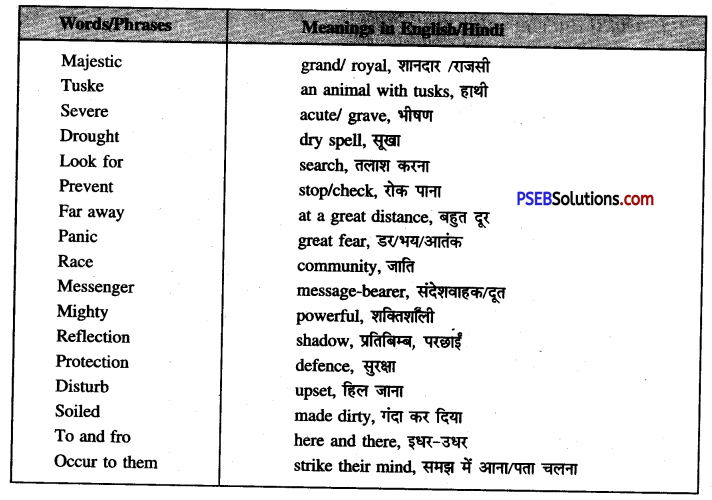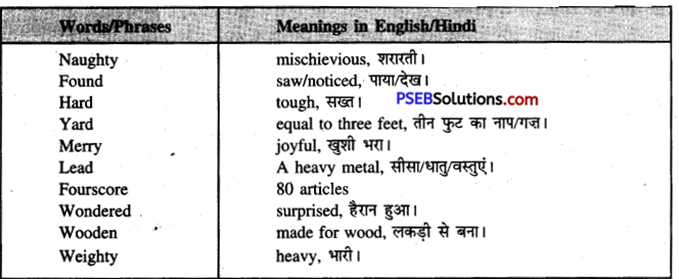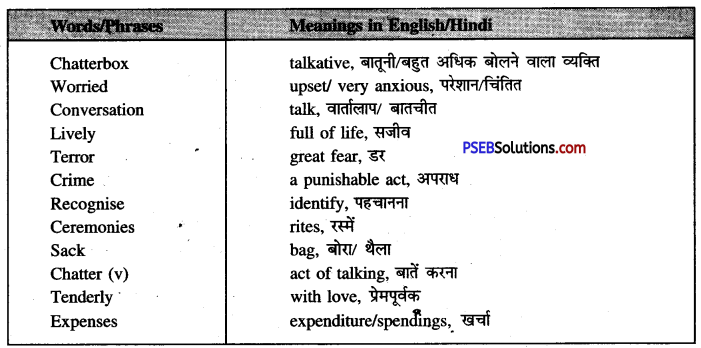Punjab State Board PSEB 9th Class English Book Solutions English Literature Book Solutions Chapter 7 The King who Limped Textbook Exercise Questions and Answers.
Class 9th English Literature Book Solutions Chapter 7 The King who Limped Question Answers
The King who Limped Class 9 Questions and Answers
Question 1.
Why were the courtiers anxious ?
(दरबारी उत्सुक क्यों थे ?)
Answer:
They were anxious to meet the new King.
वे नए राजा से मिलने के लिए उत्सुक थे।
Question 2.
How did the King look like ?
(राजा देखने में कैसा लगता था?)
Answer:
When the King enters, he is wearing a bowler hat. And he walks with a big limp.
जब राजा प्रवेश करता है तो उसने एक काला टोप पहने होता है और वह बहुत लंगड़ा कर चलता
![]()
Question 3.
Who did the King bring with him ? Why ?
(राजा अपने साथ किसे ले कर आया? क्यों?)
Answer:
The King brought with him two men. The two men were neighbours. They were fighting in the street over a dog. Each claimed to be the dog’s owner. The King brought them with him to decide their dispute.
राजा अपने साथ दो आदमी ले कर आया। वे दोनों आदमी पड़ोसी थे। वे गली में एक कुत्ते के बारे में लड़ रहे थे। उनमें से प्रत्येक कुत्ते का मालिक होने का दावा कर रहा था। राजा उनके झगड़े का फैसला करने के लिए उन्हें अपने साथ ले आया।
Question 4.
Why were the two men fighting ?
(वे दो आदमी क्यों लड़ रहे थे?)
Answer:
They were fighting over a dog. Each claimed to be the dog’s real owner.
वे एक कुत्ते के बारे में लड़ रहे थे। प्रत्येक कुत्ते का असली मालिक होने का दावा कर रहा था।
Question 5.
Why did the Chancellor and the Prime Minister walk with a limp ?
(राजपुरोहित और प्रधान मन्त्री लंगड़ा कर क्यों चल रहे थे?)
Answer:
They saw that the King had a limp. In order to please the King, they pretended that they too had a limp.
उन्होंने देखा कि राजा लंगड़ी चाल से चलता था। राजा को खुश करने के लिए वे नाटक करने लगे कि उनकी चाल भी लंगड़ी थी।
Question 6.
Who else did not walk properly ? Why?
(अन्य कौन था जो ठीक ढंग से न चला ? क्यों ?)
Answer:
One of the two Ladies-in-waiting did not walk properly. She said she had a sprained ankle. But in fact, she was only trying to walk like the King who had a limp. She thought she would thus please the King.
दो दरबारी-सेविकाओं में से एक ठीक ढंग से न चली। उसने कहा कि उसके टखने में मोच आ गई थी। किन्तु वास्तव में वह राजा की भांति चलने की कोशिश कर रही थी, जो लंगड़ा कर चलता था। वह समझती थी कि इस तरह वह राजा को खुश कर देगी।
![]()
Question 7.
How did the King return the dog to the right owner ?
(राजा ने कुत्ता सही मालिक को कैसे लौटाया?)
Answer:
It was suggested that the dog should be divided in two. The two neighbours could then have half each. The first neighbour agreed to it at once. But the second one said, “It is a good little dog. I cannot see it harmed. Let him have the dog.” Thus the King saw that the second neighbour was the real owner of the dog. He gave the dog to this man and sent the other one to prison.
यह सुझाव दिया गया था कि कुत्ते को दो हिस्सों में बांट दिया जाए। दोनों पडोसी तब आधा-आधा ले सकते थे। पहला पड़ोसी इसके लिए तुरन्त सहमत हो गया। किन्तु दूसरे ने कहा, “यह एक छोटासा सुन्दर कुत्ता है। मैं इसे कोई हानि पहुंचते नहीं देख सकता। कुत्ता उसे ही दे दीजिए।” इस तरह राजा जान गया कि दूसरा पड़ोसी कुत्ते का असली मालिक था। उसने कुत्ता इस आदमी को दे दिया और दूसरे को जेल भेज दिया।
Question 8.
Why did the King send the first neighbour to prison ?
(राजा ने पहले पड़ोसी को जेल क्यों भेज दिया?)
Answer:
The first neighbour had told a lie. He had also shown how cruel he was. So the King sent him to prison.
पहले पड़ोसी ने झूठ बोला था। उसने यह भी दिखा दिया था कि वह कितना निर्दय था। इसलिए राजा ने उसे जेल भेज दिया।
Question 9.
Why was the King not pleased with the Chancellor and the Prime Minister ?
(राजा राजपुरोहित और प्रधान मन्त्री से प्रसन्न क्यों नहीं था ?)
Answer:
The King saw that both of them were sycophants. Their suggestions relating to the dispute between the two neighbours were also foolish ones. So the King was not pleased with them.
राजा ने देखा कि वे दोनों चापलूस थे। दो पड़ोसियों के मध्य झगड़े के सम्बन्ध में उनके सुझाव भी मूर्खतापूर्ण थे। इसलिए राजा उनसे प्रसन्न नहीं था।
![]()
Question 10.
How was the first lady rewarded ?
(पहली औरत को कैसे पुरस्कृत किया गया?)
Answer:
She was made the chief Lady-in-waiting.
उसे मुख्य दरबारी-सेविका बना दिया गया।
Question 11.
Why were the courtiers amazed at the King’s behaviour ?
(दरबारी राजा के व्यवहार पर चकित क्यों रह गए?)
Answer:
The courtiers had thought the King to be a clownish fool. They were amazed when they saw how wise the King was.
दरबारियों ने राजा को एक पागल-सा मसखरा समझा था। वे चकित रह गए जब उन्होंने देखा कि राजा कितना बुद्धिमान था।
Objective Type Questions
Answer the following in one word / phrase / sentence :
Question 1.
Who is the writer of the play, ‘The King Who Limped’?
Answer:
Monica Thorne.
Question 2.
Where does the play open ?
Answer:
In the audience room of the king’s palace.
Question 3.
Who were the courtiers waiting for?
Answer:
They were waiting for the new king.
Question 4.
Why are the courtiers anxious to meet the new king ?
Answer:
Because none of them has seen the king before.
Question 5.
How does the king look when he enters the court ?
Answer:
He wears a bowler hat and walks with a big limp.
Question 6.
Who were the two men whom the king had brought ?
Answer:
They were the men who had been seen fighting in a street.
Question 7.
What does everyone stare at ?
Answer:
At the king’s bowler hat.
Question 8.
What did the previous king wear ?
Answer:
A crown.
![]()
Question 9.
What happens to the officials in the end ?
Answer:
The king removes them from their posts.
Question 10.
Who becomes the new Prime Minister ?
Answer:
The Courtier.
Complete the following :
1. The play opens in …………………. of the palace.
2. All the officials have not seen …………… before.
3. The king enters with the blowing of ……………..
4. The Second Lady says that the king is wearing a ……………….. hat.
5. The two men accompanying the king had been ……………….. in a street.
6. The two men were charged with …………………. of peace.
Answer:
1. the audience room
2. the king
3. the trumpets
4. funny
5. fighting
6. breach.
Write True or False against each statement :
1. The king walked with a big limp.
2. The king was wearing a crown.
3. The two men were gossiping in the middle of a street.
4. Each of the neighbours was claiming the dog as his.
5. The Chancellor was promoted to a higher rank.
6. The Courtier was made the Prime Minister.
Answer:
1. True
2. False
3. False
4. True
5. False
6. True.
Choose the correct option for each of the following :
Question 1.
The king was …………
(a) very wise
(b) very kind
(c) justice-loving
(d) a big fool.
Answer:
(d) a big fool.
Question 2.
The officials behaved ….. before the king.
(a) foolishly
(b) wisely
(c) strangely
(d) arrogantly.
Answer:
(a) foolishly
Question 3.
The Prime Minister did not like ………………. sitting on the arm of the throne.
(a) the Chancellor
(b) the First Lady
(c) the Courtier
(d) one of the neighbours.
Answer:
(a) the Chancellor
![]()
Question 4.
The king sees everybody staring at ……….
(a) the First Lady
(b) the neighbours
(c) his bowler hat
(d) the dog.
Answer:
(c) his bowler hat
The King who Limped Summary in English
The King who Limped Introduction:
It is a simple, humorous play. It makes fun of people who try to please others by flattery. They are sycophants. They have no worth of their own. Such people don’t deserve the position they hold. They use flattery as a tool to maintain their position. But a wise person at once sees through their cunning and keeps them at arm’s length. In this play, a new king comes to his court limping and wearing a funny hat. He wants to see if there are any sycophants in his court. In order to please the King, the Prime Minister, the Chancellor and a fat lady-in-waiting start limping. They also get the kind of hat the King is wearing. The King at once sees that these people have no worth at all. They don’t know how to decide even a simple case. The King removes these sycophants from their positions. He appoints those who really deserve it.
The King who Limped Summary in English
The play opens in the Audience Room of the King’s palace. The Prime Minister, the has ncellor, two Ladies-in-waiting and a Courtier are waiting for the new King. None of them – seen the new King before and they are anxious to meet him.From the way they behave in the King’s absence, we get an idea of what kind of people they are. Of the two ladies-in-waiting, the First Lady is tall and slim. The Second Lady is short and very fat. The Prime Minister starts talking foolishly. The First Lady calls him silly.
The Second Lady says that it does not matter how silly he is if he is the Prime Minister. The Chancellor is sitting on the arm of the King’s throne. The Prime Minister at once goes up the steps, pushes the Chancellor away, and sits on the throne. Seeing this, the courtier says meaningfully, “I expect the Prime Minister found the steps hard.” Then through the window, he says that it is raining outside, yet there are crowds of people in the street. Among them he sees the new King coming and says, “Well, that’s queer !”
Second Lady : What’s queer ?
Courtier : Never mind; you’ll soon see.
Second Lady : I do hope he is handsome.
Chancellor : Of course, he is handsome.
Prime Minister : I do hope he won’t want his own way too much.
Chancellor : Of course, he won’t want his own way too much.
Courtier : Why shouldn’t he want his own way
![]()
The sound of a trumpet is heard. Both the Prime Minister and the Chancellor try to look important and take positions on either side of the throne. The King enters with the blowing of trumpets. He is wearing a bowler hat and walks with a big limp. Behind him is a Page carrying a dog on a cushion. Behind the Page, there are two Neighbours. Each of them is holding a chain attached to the dog’s collar. The King goes up to the throne. Everyone looks astonished at the King’s unusual appearance. The Second Lady says in a whisper that the King is wearing a funny hat. The Prime Minister whispers that the King limps.
The Prime Minister wants to know about the two meñ the King has brought with him. The King says that he had seen them fighting in the street and brought them with him to settle their dispute. The Chancellor says that it is unusual to bring common people into the · palace. At this the King says, “What did you expect me to do ? Let them go on fighting ?”
The King sees everyone staring at his bowler hat. He asks them what wrong is with his hat. The Chancellor says that their previous King used to wear a crown. The King says, “What ! In this blazing sun ?” He says that he was wearing a hat to save himself from sunstroke. At once the Chancellor takes off his coronet and hands it to a servant. Both the Prime Minister and the Chancellor get for themselves the bowler hats to wear. They start limping also like the King. The King asks them what trouble they have.
The Prime Minister says that he has got a cramp in his leg. The Chancellor says that he has rheumatism. The Second Lady is also seen limping. She says she has sprained her ankle. Both the First Lady and the Courtier behave in their normal, natural manner. The King asks them if there is nothing wrong with them. Both of them say that they have always been very healthy.
The Pointing to the two Neighbours, the King asks the Prime Minister what he should do w them. The Prime Minister says that both of them should be put in prison.
King : What for?
Chancellor : For causing a breach of peace.
Second Lady : What is a breach of peace ?
First Lady : Be quiet. You are one !
King : (To the Courtier) What would you do ?
Courtier : I would listen to what they have to say.
At this, the King asks the two Neighbours what they have to say for themselves. The First Neighbour says that he had found the dog starving in the street. He took the dog home and fed it for three months. The Second Neighbour calls the First Neighbour a liar. He says that the dog was his, and it was given to him by his brother. When the King asks him to go and fetch his brother, he says that his brother is dead. Thus it becomes difficult to decide who the real owner is.
King : What is to be done now?
Courtier : Keep the dog yourself, Your Majesty. Then no one can quarrel about it.
King : But I don’t care for dogs. I like cats better.
First Lady : Why not divide the dog in two and give them half each?
The First Neighbour at once agrees to it. But the Second one says, “Let him keep the dog, Your Majesty. It is a good little dog. I cannot bear to see it harmed. Let him have the dog.” The King at once knows the truth. He gives the dog to the Second Neighbour and sends the First one to prison. Then he gets up, takes off his bowler hat and puts it on the throne. Now he walks quite naturally and comes to the Chancellor.
![]()
King : Have you still got rheumatism?
Chancellor : Your Majesty, the pain is going off.
King : Why are you wearing a bowler hat ? It looks funny.
Chancellor : Because it is a sunny day, as you yourself said, Your Majesty.
King : Rubbish ! You limped because I limped.
You wore a bowler hat because I wore one. It is raining outside, but you say it is a sunny day, because I said it was a sunny day. You are what they call a sycophant. ………… I put on a limp and wore a funny hat to find out, if there were any honest people in the court. I have found two.
The King removes the Chancellor, the Prime Minister and the Second Lady-in-waiting from the positions they are holding. He makes the Courtier his Prime Minister and the First Lady the chief Lady-in-waiting. And he orders his men to take the bowler hats to the town museum and put them there.
The King who Limped Summary in Hindi
The King who Limped Introduction:
यह एक साधारण-सा हास्यरस का नाटक है। यह ऐसे लोगों का मजाक उड़ाता है जो चापलूसी के द्वारा दूसरों को खुश करने की कोशिश करते हैं। उन्हें ‘जी-हजूर’ या ‘चमचे’ कहा जाता है। इस तरह के लोग उस पदवी के पात्र नहीं होते जहां वे लगे होते हैं। अपनी पदवी को बनाए रखने के लिए वे चापलूसी को एक हथियार के रूप में इस्तेमाल करते हैं। किन्तु एक बुद्धिमान व्यक्ति उनकी दुष्टता को तुरन्त समझ जाता है और उन्हें स्वयं से दूर रखता है। इस नाटक में एक नया राजा अपने दरबार में एक हास्यजनक टोप पहने हुए और लंगड़ाते हुए आता है। वह देखना चाहता है कि क्या उसके दरबार में कोई चापलूस किस्म के लोग हैं। राजा को प्रसन्न करने के लिए उसका प्रधान मंत्री, और प्रधान धर्माधिकारी (राजपुरोहित) और एक मोटी-सी दरबारी सेविका भी लंगड़ाने लगते हैं। वे उस तरह के टोप भी मंगवा लेते हैं जो कि राजा पहने हुए है। राजा को तुरन्त पता चल जाता है कि इन लोगों में बिल्कुल कोई योग्यता नहीं है। उन्हें एक साधारण-सी समस्या का समाधान करना भी नहीं आता है। राजा इन चापलूसों को उनके पदों से हटा देता है। वह उन लोगों को नियुक्त कर देता है जो वास्तव में ही इसके पात्र हैं।
![]()
The King who Limped Summary in Hindi
नाटक का दृश्य शाही महल के भेंट-कक्ष में शुरू होता है। प्रधान मन्त्री, राजपुरोहित, दो दरबार-सेविकाएं और एक दरबारी नए राजा की प्रतीक्षा कर रहे होते हैं। उन में से किसी ने नए राजा को नहीं देखा है और वे उस से मिलने को उत्सुक हैं। दरबार-सेविकाओं में से पहली सेविका लम्बी और पतली है।
दूसरी नाटी और बहुत मोटी है। प्रधान मन्त्री मूर्खतापूर्ण ढंग से बातें करने लगता है। पहली सेविका उसे मूर्ख कहती है। दूसरी कहती है कि इस से कोई अन्तर नहीं पड़ता कि वह कितना मूर्ख है यदि वह प्रधान मन्त्री के पद पर है। राजपुरोहित सिंहासन के बाजू के ऊपर बैठा होता है। प्रधान मन्त्री तुरन्त सिंहासन की सीढ़ियों से ऊपर को जाता है, राजपुरोहित को धकेल कर परे कर देता है और सिंहासन पर बैठ जाता है। यह देख कर दरबारी अर्थपूर्ण ढंग से कह देता है, “मेरे विचार से प्रधान मन्त्री को सीढ़ियां चढ़नी कठिन महसूस हुई होंगी।” फिर खिड़की में से बाहर को देखते हुए. वह कहता है कि वहां वर्षा हो रही है फिर भी गली में लोगों की भीड़ इकट्ठी हो रही है। उनके मध्य उसे नया राजा दिखाई पड़ जाता है, और वह कह उठता है, “अरे, बड़ा अजीब है!”
दूसरी सेविका – क्या अजीब है ? दरबारी – चिन्ता मत करो; तुम्हें जल्दी पता चल जाएगा ? दूसरी सेविका – मैं समझती हूं कि वह सुन्दर होगा। राजपुरोहित – निश्चय ही वह सुन्दर होगा। प्रधान मन्त्री – मुझे आशा है कि वह अपनी ज्यादा इच्छा नहीं चलाना चाहेगा। राजपुरोहित – निश्चय ही वह अपनी ज़्यादा इच्छा नहीं चलाना चाहेगा। दरबारी – वह अपनी इच्छा क्यों न चलाना चाहे ढोल-नगाड़े की आवाज़ आती है। प्रधान मन्त्री और राजपुरोहित दोनों महत्त्वपूर्ण दिखलाई देने का यत्न करते हैं और सिंहासन के दोनों तरफ अपनी जगहों पर खड़े हो जाते हैं। ढोल-नगाड़ों के मध्य राजा प्रवेश करता है। वह एक काला टोप पहने हुए है और बहुत लंगड़ा कर चलता है।
उसके पीछे-पीछे एक द्वारपाल है जिसने एक गद्दे के ऊपर एक कुत्ता उठाया हुआ है। उसके पीछे दो आदमी हैं जो एक-दूसरे के पड़ोसी हैं। उन दोनों में से प्रत्येक ने एक जंजीर पकड़ी हुई है जो कुत्ते के पट्टे के साथ लगी हुई है। राजा ऊपर सिंहासन के पास चला जाता है। प्रत्येक व्यक्ति राजा के असाधारण वेश को देखता है और हैरान हुआ खड़ा रहता है। दूसरी सेविका दबी हुई आवाज़ में फुसफुसाते हुए कहती है कि राजा ने एक हास्यजनक टोप पहना हुआ है। प्रधान मन्त्री दबी हुई आवाज़ में कहता है कि राजा लंगड़ाता है।
प्रधान मन्त्री उन दो आदमियों के बारे में जानना चाहता है जिन्हें राजा अपने साथ लाया है। राजा कहता है कि उस ने उन्हें गली में लड़ते हुए देखा था और वह उनके झगड़े को निपटाने के लिए उन्हें अपने साथ ले आया था। राजपुरोहित कह देता है कि साधारण लोगों को महल में लाना एक असामान्य बात है। इस पर राजा कह देता है, “तो तुम मुझ से क्या करने की आशा करते थे? उन्हें वहां लड़ने के लिए छोड़ देता ?”
राजा देखता है कि सभी उसके काले टोप की तरफ आंखे फाड़े देख रहे हैं। वह उनसे पूछता है कि उसके टोप में क्या खराबी है। राजपुरोहित कहता है कि उनका पहला राजा एक ताज पहना करता था। राजा कहता है, “क्या ! इस कड़कती धूप में?” वह कहता है कि वह स्वयं को सूर्य के ताप से बचाने के लिए टोप पहने हुए था। तुरन्त राजपुरोहित अपना मुकुट उतार देता है और इसे एक नौकर को पकड़ा देता है। प्रधान मन्त्री तथा पुरोहित दोनों अपने लिए पहनने को काले टोप मंगवा लेते हैं। वे राजा की भांति लंगड़ाने भी लगते हैं।
राजा उनसे पूछता है कि उन्हें क्या तक़लीफ है। प्रधान मन्त्री कहता है कि उसकी टांग की नाड़ी खिंच गई है। राजपुरोहित कहता है कि उसे गठिया हुआ पड़ा है। दूसरे नम्बर वाली दरबार-सेविका (Second Lady) भी लंगड़ाती हुई दिखाई देती है वह कहती है कि उसके घुटने में मोच आ गई है। किन्तु पहले नम्बर वाली दरबार-सेविका (First Lady) और राजदरबारी (Courtier) दोनों अपने स्वाभाविक और सामान्य ढंग से व्यवहार करते रहते हैं। राजा उनसे पूछता है कि क्या उन्हें कोई तक़लीफ नहीं है। वे दोनों कहते हैं कि वे सदा ही स्वस्थ रहते हैं।
![]()
दोनों पड़ोसियों की तरफ़ इशारा करते हुए राजा प्रधान मन्त्री से पूछता है कि वह उनका क्या करे। प्रधान मन्त्री कह देता है कि उन दोनों को जेल में डाल दिया जाए।
राजा : किस कारण से?
राजपुरोहित : शान्ति भंग करने की वजह से।
दूसरी सेविका : शान्ति भंग क्या होता है ?
पहली सेविका : चुप रहो। तुम शान्ति भंग ही हो!
राजा : (दरबारी से) तुम क्या करते?
दरबारी : मैं सुनता कि उन्हें क्या बात कहनी है।
इस पर राजा दोनों पड़ोसियों से पूछता है कि उन्हें अपने-अपने पक्ष में क्या कहना है। पहला पड़ोसी कहता है कि उसे कुत्ता गली में भूख से तड़पता हुआ मिला था। वह कुत्ता घर ले गया और तीन महीने तक खिलायापिलाया। दूसरा पड़ोसी पहले पड़ोसी को एक झूठा आदमी कहता है। वह कहता है कि कुत्ता उसका है, और यह उसे उसके भाई ने दिया था। जब राजा उसे कहता है कि वह जा कर अपने भाई को लाए, तो वह कहता है कि उसका भाई मर गया है। इस तरह यह फैसला करना कठिन हो जाता है कि कुत्ता किसका है।
राजा : अब क्या किया जाए ?
दरबारी : कुत्ता अपने पास रख लीजिए, महाराज। तब उन में से कोई भी इस के बारे में नहीं लड़ेगा।
राजा: लेकिन मुझे कुत्ते अच्छे नहीं लगते; मुझे बिल्लियां अच्छी लगती हैं।
पहली सेविका : कुत्ते को दो टुकड़ों में क्यों न बांट दिया जाए और उन दोनों को आधा-आधा दे दिया जाए।
पहला पड़ोसी तुरन्त इसके लिए सहमंत हो जाता है। किन्तु दूसरा कहता है, “महाराज, कुत्ता उसे ही रख लेने दीजिए। यह एक सुन्दर छोटा-सा कुत्ता है। मैं इसे कोई कष्ट पहुंचता नहीं देख सकता। उसे ही कुत्ता ले लेने दीजिए।” राजा को तुरन्त सच्चाई समझ आ जाती है। वह कुत्ता दूसरे पड़ोसी को दे देता है तथा पहले को जेल भेज देता है। फिर वह खड़ा हो जाता है। अपना काला टोप उतारता है और इसे सिंहासन के ऊपर रख देता है। अब वह बहुत साधारण ढंग से चलता है और राजपुरोहित के पास आ जाता है।
राजा : क्या तुम्हें अब भी गठिया है?
राजपुरोहित : महाराज, दर्द अब समाप्त होता जा रहा है।
राजा : तुम यह काला टोप क्यों पहने हुए हो? यह तो हास्यजनक लग रहा है।
राजपुरोहित : क्योंकि आज बहुत धूप वाला दिन है, जैसा कि, महाराज, आप ने स्वयं ही कहा था।
राजा बकवास! तुम लंगड़ाने लगे थे क्योंकि मैं लंगड़ा रहा था। तुम ने काला टोप पहन लिया क्योंकि मैंने काला टोप पहना हुआ था। बाहर वर्षा हो रही है, लेकिन तुम कहते हो कि आज धूप वाला दिन है, क्योंकि मैंने कह दिया था कि आज धूप वाला दिन है। तुम वह हो जिसे लोग ‘चमचा’ कहते हैं।
मैंने लंगड़ा होने का नाटक किया था और एक काला टोप पहन लिया था, यह जानने के लिए कि क्या यहां दरबार में कोई ईमानदार लोग हैं। मुझे दो ही मिले हैं। राजा प्रधान मन्त्री, राजपुरोहित और दूसरी दरबार-सेविका को उन की पदवियों से हटा देता है। वह दरबारी को अपना प्रधान मन्त्री बना लेता है तथा पहली सेविका को मुख्य दरबारी-सेविका बना देता है और वह अपने आदमियों को आदेश देता है कि वे काले टोपों को ले जा कर नगर के अजायबघर में रख दें।
![]()
The King who Limped Translation in Hindi
(Page 54) 1. limped-लंगड़ा कर चलता था; 2. sycophant-चापलूस ; 3. courtier-दरबारी ; 4. Lady-in-waiting-राजदरबार में नौकरानी ; 5. page-सन्देशवाहक।
(Page 55) 1. chancellor-राज्य का उच्चाधिकारी; 2. anxious-उत्सुक; 3. plump—मोटा; 4. throneसिंहासन; 5. Excellency-किसी शाही पदवी वाले व्यक्ति को सम्मान सूचक सम्बोधन; 6. His Majesty – राजा को सम्बोधन; 7. tyrant-निर्दय शासक; 8. rice pudding-चावलों का पुलाव; 9. rude—गुस्ताख।
(Page 56) 1. trumpet-तुरही; 2. craning-गर्दन उठा कर देखना; 3. queer-विचित्र; 4. puff-अभिमान से भरे हुए; 5. smoothes-सिलवटें दूर करती है।
(Page 57) 1. heralds-उद्घोषक; 2. bowler hat-काला टोप; 3. pronounced limp—अत्यधिक लंगडा कर; 4. buzzफुसफुसाहट; 5. astonishment-आश्चर्य; 6. unusual-विचित्र; 7. appearance-आकृति; 8. bold—गुस्ताख; 9. arbitrate-झगड़े का निर्णय करना।
(Page 58) 1. stare-घूरना; 2. crown-ताज; 3. sunstroke-लू लगना; 4. coronet-छोटा मुकुट ।
(Page 59) 1. cramp—ऐंठन; 2. imitating-नकल उतारना; 3. rheumatism-गठिया; 4. sprainedमोच; 5. convalescent-स्वास्थ्य लाभ करना; 6. quarrelsome-झगड़ालू; 7. ribs—पसलियां।
(Page 60) 1. breach of peace-शान्ति भंग करना; 2. goodness sake-भगवान के लिए; 3. crushedलज्जित; 4. fetch-लाना; 5. witness-गवाह; 6. starving-भूखा मर रहा।
(Page 61) 1. remarkable-शानदार; 2. a man of few words-बहुत कम बोलने वाला व्यक्ति; 3. murmur-फुसफुसाना; 4. evidenceसबूत; 5. splendid-शानदार।
![]()
(Page 62) 1. seize-पकड़ना; 2. innocent—निर्दोष; 3. struggling-यत्न कर रहा; 4. severelyसख्ती से; 5. still-चुप रहना; 6. rascal-दुष्ट, बदमाश; 7. rightful सही; 8. interrupting-बीच में बोलते हुए; 9. impatiently—अधीरता से; 10. nuisance-हो-हल्ला ; 11. meaningly-अर्थपूर्ण ढंग से।
(Page 63) 1. ridiculous—हास्यप्रद, बेढंगी; 2. rubbish-बकवास; 3. pouring with rain-मूसलाधार वर्षा; 4. flatter-चापलूसी करना; 5. sensible-तर्कपूर्ण; 6. snatches-छीन लेता है; 7. gossip—गप्पबाजी।
(Page 64) 1. amazement—हैरानी से।
Class 9 English Literature Book PSEB Supplementary Reader



